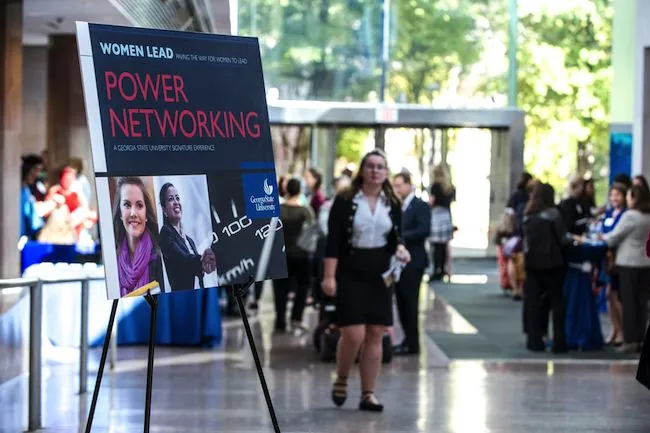
WomenLead Power Networking event. Courtesy photo.
The term Year of the Women was first attached to the year 1992, where a record five women, including the first black woman, was elected to the Senate. More recently, there’s been debate that 2018 would be the Year of the Women, as the #metoo movement has gained even more traction, the media has given more coverage to female activists and leaders, and in business, more female CEOs are speaking up and female-founded companies are receiving more public support.
In line with this, the Farmer School of Business at Miami University has launched a new program on female entrepreneurship this fall. The Advancing Women in Entrepreneurship program is focused on building an environment where female founders are as common as male founders, a far cry from the landscape as it is today.
Pitchbook data revealed in 2017, that just 2.2% of all venture capital in the U.S. went to female-founded companies, and just about 4.4% of venture capital transactions in the U.S. were for companies founded by women. On the investor side, just 11.3% of VC partners in the U.S. are female.
Professor Elizabeth Troy, who is leading the new program, says that the time is ripe for change to happen at the collegiate level for the future of female entrepreneurs.
“We began developing the program back in spring with the aim of creating support for female students to get the same defined skillset as their male counterparts for success in the business environment,” Troy tells Poets&Quants. And as proof that Miami University students were indeed ready for such a program, she says that their Fall kickoff event held last week was attended by almost 600 students, who filled every seat and standing space. “The turnout exceeded our expectations with a 50/50 male-to-female ratio,” she says.
CURRICULUM DESIGNED SPECIFICALLY FOR THE FUTURE BUSINESS WOMAN
Troy believes that the millennial generation is more than ready for this change as they grew up with the understanding that diversity and inclusion makes for good business, and don’t need convincing on the value of having a diverse representation. She says that traditionally, it has been found that males receive preferential treatment even in classrooms and women don’t “lean in” in classroom spaces, which is echoed at workplaces as well.
“This is the opportunity for us to create a class that creates curriculum for a female audience, having a curriculum where they address behaviors they may meet,” Troy says. “It’s a chance to prep women for experiences, challenges, and opportunities they may specifically face in the business environment.”
As part of the program, students will be spending a week in Cincinnati and a week in San Francisco this winter visiting offices and meeting with and learning from female-led organizations.
SIMILAR PROGRAM LAUNCHES AT DEPAUL UNIVERSITY
Lily Thaler, a sophomore at Miami University, is president of the two-month-old Advancing Women in Entrepreneurship student organization that already has about 50 active members, and will be among those traveling to meet with women leaders.
“It’s different to hear from the women themselves. There are diversity challenges females face that men just don’t need to think about,” she said. “My dream is that women entrepreneurs will be empowered to have the same education, resources, and support as men.”
In July this year, DePaul University’s Coleman Entrepreneurship Center also announced the launch of a new Women in Entrepreneurship Institute. The institute aims to increase female founders’ access to resources, while supporting research on how women-owned businesses are funded. Starting Spring 2019, the College of Business will also begin teaching a course on women in entrepreneurship, featuring leading women entrepreneurs around the Chicago area as speakers.
WE SEE THE MEN, NOT YET THE WOMEN
Susan Davis-Ali, a Miami alum and founder and CEO of Leadhership1, an online coaching program for women in leadership, helps to coach women in tech who are looking to advance to the next step of their careers.
One of the biggest issues, she says is that both men and women see men as leaders, and the unconscious bias plays out in the gender disparity in management. While we barely blink when we meet a male leader, she says most of us notice when a leader is a woman, and note that it’s unusual.
The other issue, she says, is the likability penalty. Both men and women like men who advance, yet while we like men more as they advance in their careers, we like women less as they advance. As a result, women almost have to choose between being liked and advancing, while men don’t have to make that choice, Davis-Ali says.
While the program at Miami University is about advancing women, Troy says it has attracted the attention of both male and female students. This is ideal, she says, as it’s important to bring men into the dialogue of how to build inclusive environments. She adds that one of the best things about starting this program is the ideal age population as most students are between the 18- and 22-year-old age range, where the decisions they make as fresh graduates will have exponential impacts on their lifelong careers.











Questions about this article? Email us or leave a comment below.